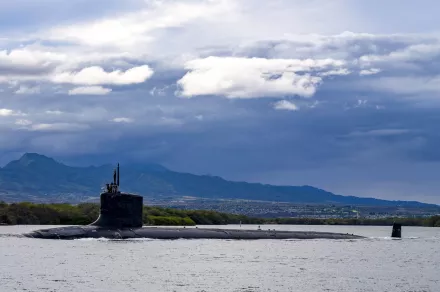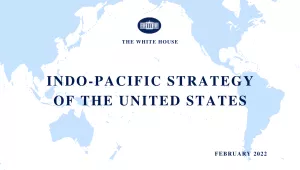
About the Program
The Asia-Pacific Initiative was dedicated to studying opportunities and challenges facing one of the most diverse, complex, and pivotal regions of the world. Leveraging the resources and expertise at Harvard University, the initiative analyzed issues increasingly defining the broader Asia-Pacific as the emerging economic, technological, and geopolitical center of gravity in the 21st century, and developed constructive approaches to promote peace and prosperity in the region.

Elements of the U.S. Indo-Pacific Strategy
Published May 2023, this primer provides a concise background of three major elements of the Biden administration’s Indo-Pacific Strategy: the Quad, a non-traditional multilateral grouping of India, Japan, Australia, and the U.S.; the AUKUS security pact between Australia, the United Kingdom, and the U.S.; and the Partners in the Blue Pacific, a multilateral initiative aimed at promoting greater alignment with the Pacific Island nations.
Overview: The Asia-Pacific Region
Stretching from the Pacific coast of the United States to the Indian Ocean, the Asia-Pacific is one of the most culturally, economically, and politically diverse regions of the world. It is home to more than half of the world’s population, two-thirds of the world’s economy, and seven of the largest military forces on the planet. The region includes large economies like India, Japan, and China, but is also home to numerous developing economies and small island nations.
The United States is a Pacific power and has had significant security and economic interests in the region for more than a century. From treaty alliances with Australia, Japan, the Republic of Korea, and the Philippines to three million American jobs and $1 trillion in foreign direct investment, successive Republican and Democratic administrations have recognized the importance of engagement in Asia. Today, the U.S. faces critical challenges in the region—from managing competition with China to revitalizing relations with allies and partners in Southeast Asia; from reimagining economic statecraft to addressing the threats posed by emerging technologies.
In conjunction with Belfer Center's Future of Diplomacy Project and Defense Project, the Asia-Pacific Initiative looked to analyze issues that have increasingly defined the region as the emerging economic, technological, and geopolitical center of gravity in the 21st century, and developed constructive approaches to promote peace and prosperity in the region. Leveraging Harvard’s resources and expertise in regional studies, history, economics, and diplomacy, the project researched trend lines and identified solutions to challenges.
In addition to producing timely, rigorous, and innovative research, the Initiative also equipped a rising generation of scholars and practitioners with the tools and expertise necessary to tackle central challenges in the region, from security and defense to trade and economics to science and technology. By harnessing Harvard’s convening power, the project brought distinguished academics and seasoned policymakers into dialogue through a series of working groups, seminars, and lectures.





